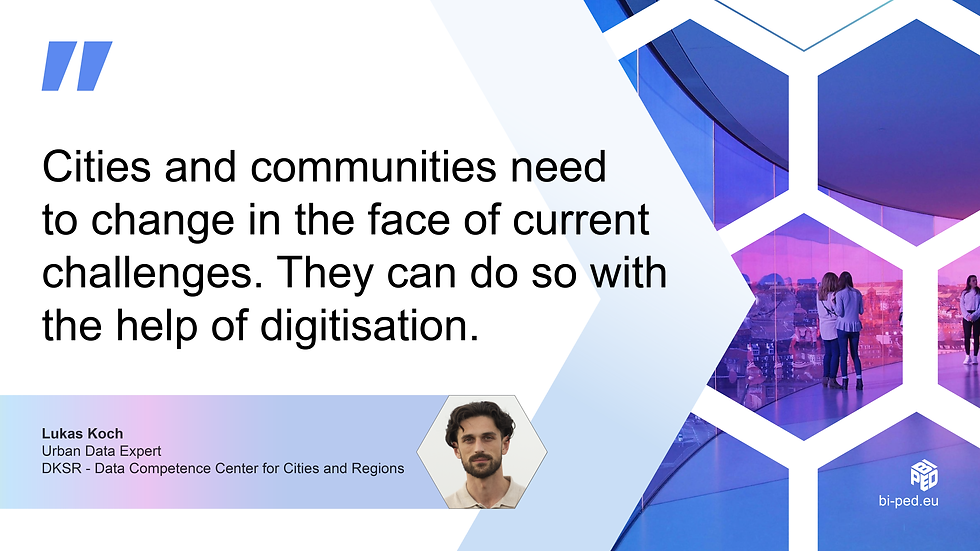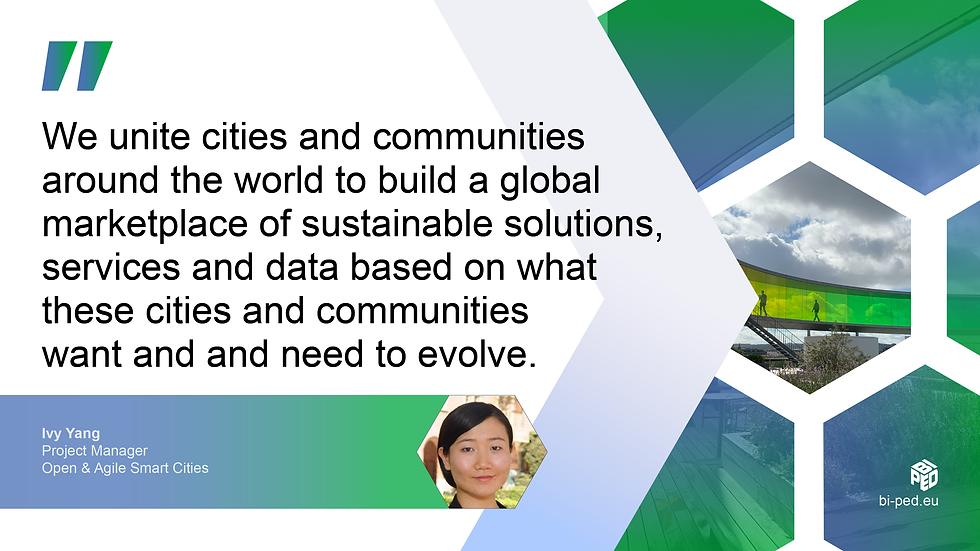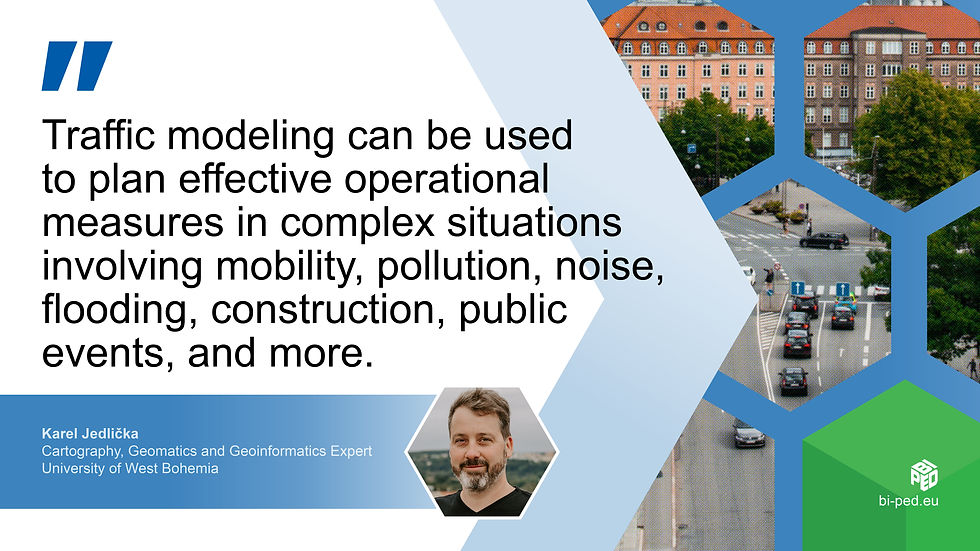The A-Team Behind BIPED: Building Climate Resilient Cities, Together
- pavel7733
- May 3, 2024
- 6 min read
What makes a successful project? Is it technology used? Company brands participating? For us, the answer is none of the above; it all comes down to THE PEOPLE, those passionate individuals who join forces to achieve a common vision.
In BIPED, we envision a future where cities, once fretful about the 2030 Agenda, feel confident they can reach climate-neutrality through an ambitious district transformation that is green, digital, and just. Making this vision a reality is what inspired us to create BIPED in the first place.
Now that we are up and running as a 13-strong international consortium, it's time to introduce the team members one by one. As well as giving you an idea about who is who and what they bring to the table, we hope that partner descriptions and especially their testimonials will also inspire you to act on the climate challenges facing our cities.

Technical University Denmark
Technical University of Denmark (DTU) is ranked among Europe’s leading engineering institutions. From DTU’s mathematics and computer science department (DTU Compute) comes our top-notch coordinating unit led by Martin Brynskov, Rasmus Reeh, Henrik Madsen, and others. With such an expert, multi-disciplinary team looking after BIPED, we know we are in good hands and definitely poised to accelerate energy transition - as outlined in our vision - one district at a time.

Aarhus Kommune
The City of Aarhus is committed to combating climate change and becoming a sustainable, climate-neutral smart city by 2030. Working with ITK Aarhus Kommune, the city's department for Innovation, Technology and Creativity, BIPED will support Aarhus in this ambitious endeavour, by co-creating pathways for PED development that is both intelligent and inclusive, data-driven and citizen-led.

Austrian Institute of Technology
Austrian Institute of Technology is Austria's largest research and technology organisation with expertise in energy, transport, digitalisation, governance, and systems innovation. Also positive energy districts, the concept AIT has studied for over a decade. All this makes AIT well-position to lead our work on the development of PED's digital twin and its integration with data spaces. AIT will be introducing novel parameters to the digital twin models to account for diverse processes, interactions and phenomena present in urban environments. This means we will be going beyond the traditional domains of energy, environment, transport and buildings, to cover the less represented - but by no means less important - city's social dimension. So, things like perceptions of safety, comfort level, happiness, sense of community etc.

Center Denmark
Founded in 2019, Center Denmark (CDK) soon became a key player in the country's energy transition. The non-profit is co-leading the Secretariat that helps Danish municipalities with CO2 accounting. CDK developed a generic data model for district heating to improve its coupling with other sectors. And it manages an extreme-scale data platform on energy consumption/production. CDK's role in BIPED is primarily to support the use of data from diverse sources to help partners develop new data-driven services for efficient energy and resource use. Throughout the project, CDK will be further developing its data platform to facilitate multi-source data integration across space, time and industries.
Making sector-coupled datasets available for data-driven services - both research and commercial - will help spur innovation and accelerate energy transition in Braband, Aarhus, and beyond.

Data Competence Center for Cities and Regions
Based in Germany, the Data Competence Center for Cities & Regions (DKSR) offers an open source urban data platform that allows real-time data to be integrated, linked, and applied as needed to address various urban needs, including but not limited to more efficient traffic control in a digital twin environment,more environmentally sensitive building management, and more disability-friendly mobility services. DKSR's platform will serve as the main data hub for BIPED, coupling existing resources and infrastructures in the City of Aarhus plus local utilities provided through Center Denmark. DKSR's platform will be a robust component in the overall architecture of the project, during which time new interfaces will be established, particularly for the connection of cross-sector data models.

Digital Resilience Institute
In the age of rapid change, the need for more resilience - in cities, organisations, communities, individuals - couldn't be greater. Digital Resilience Institute was founded with this need in mind. The association encourages collaboration between governments, academics and practitioners from across all of Europe to exchange knowledge on digital technologies, to stimulate cutting-edge research, and to support responsible, human-centered innovation. In BIPED, DRI will support the City of Aarhus in its efforts to make PED more democratic. This is important because Positive Energy Districts are not just about generating clean power or technology innovations. They are also about igniting a spark of inspiration within communities, empowering them to envision and enact meaningful change for a brighter, more sustainable future.

InnoConnect
As we redevelop our cities to create more sustainable urban environments, one of the expected co-benefits is improved road safety. In this context, a multi-dimensional analysis of traffic accidents is needed to guide the design and evaluation of urban policies to ensure that car-free city centers, cycling paths, micro-mobility and other measures result in less accidents/injuries, not more. Supporting the City of Aarhus in this endeavour is InnoConnect, a digital start-up with an established track record of helping cities in Europe, the US, and Africa to create safer urban environments through advanced geospatial data analytics.

KPMG
It's trite but true that the future is unpredictable. Decision makers need evidence-based analysis to anticipate and prepare for new trends and challenges in a rapidly changing world. Successfully navigating uncertainty requires strategic thinking, business acumen, data insight and analytics, a blend that KPMG Future Analytics has brewed over the years and is now bringing to BIPED. The project partner is responsible for the design and creation of the monitoring and evaluation methodology and a PED assessment framework. This responsibility will be paired with the innovation management of the BIPED digital solutions and ensuring continuity of BIPED results after the end of the project.

Open & Agile Smart Cities & Communities
Open & Agile Smart Cities & Communities is a non-profit, international network of smart cities and communities. OASC connects more than 150 smart cities worldwide, which are organised into national networks that span 30+ countries and regions. In BIPED, OASC experts will lead activities on impact monitoring, guidelines and replicability. The aim is to stimulate effective engagement of stakeholders and end-users while ensuring that their needs are reflected in PED development and subsequent solution adoption and scaling.

RoadTwin
Digital modeling has been extensively used in transportation to create virtual copies of physical assets (car, road) and processes (traffic flow). With the advent of digital twins, transport system can become better connected to physical reality, not only ingesting data from the real world, but also influencing it through a 2-way sync. The road twin can inform drivers using messaging signs of a likely build-up of traffic further up the highway caused by weather, construction, accident etc. Or it might signal to the energy twin where an influx of EVs is expected, so that energy can be channelled there from quieter places. With a partner conveniently called RoadTwin, we will be testing complex scenarios involving traffic, energy and environment to identify optimal coordinated interventions across several smart city systems.

University of West Bohemia
University of West Bohemia has been at the forefront of scientific research in the Czech Republic. Its list of innovations ranges from smart windows that control the passage of heat to a smart rescue outfit for firefighters. Another area of excellence is geomatics. Here, UWB experts have been developing novel methods for collecting and processing geospatial data with a view to improving its application in various urban and natural environments. By bringing this expertise to BIPED, UWB will support the project’s applied research on the environmental impact of transportation in positive energy districts. BIPED’s digital twin will provide the virtual space for conducting what-if analyses across mobility, urban environment, pollution, noise, climate, energy and other domains to determine an optimal strategy for PED design.

UTRIUSQUE
In the early Local Digital Twin implementations, the focus was primarily on modeling physical assets and material equivalents of smart cities. But as technologies mature and new tools, models and data collection techniques become available, LDTs have the ability to represent urban dynamics more holistically by adding the social dimension. Why is it important?Understanding how people experience built environment is key to citizen-centric urban planning. If integrated well, soft data on resident's emotional wellbeing, perception of safety, urban stressors etc. can make LDT a powerful vehicle of ICT enabled policy-society interface. However, doing it well is not just about technical quality. Given that soft daft can be quite sensitive, ethics is of paramount concern. Helping us address this important aspect is Utriusque, a legal practice, whose long-standing expertise in legal affairs and GDPR will ensure that our LDT aligns with best practices in data privacy and security.

Virtual City Systems
Since 2005, Virtual City Systems has been at the forefront of 3D city modelling, creating next-generation digital solutions for smart urban planning. Having helped cities all over Europe to embrace the digital twin technology, VCS is now bringing its geospatial expertise to BIPED. Under the skillful leadership of VCS we will co-develop a local digital twin platform for the City of Aarhus, ensuring that international standards are properly integrated to achieve maximum interoperability. The platform will boast a simulation environment for policy prototyping, essentially a virtual place where local stakeholders can test intervention strategies to select optimal scenarios for PED development.




Comments